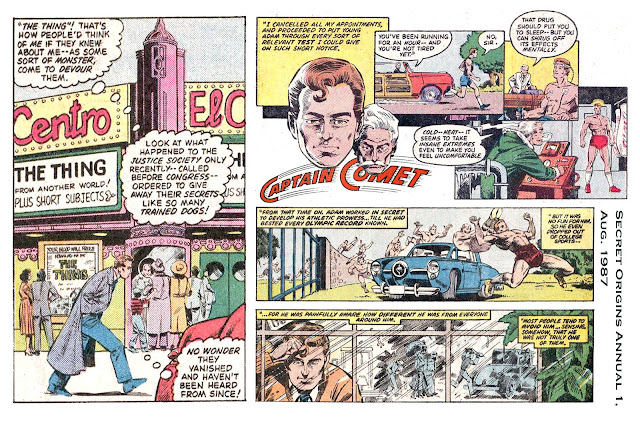July 1954: This Objective Earth
Colonial imperialism is satirized
in Interplanetary War Base! (Strange Adventures 46, July 1954).
With artist Gil Kane taking over
for Murphy Anderson, the story begins with one of writer John Broome’s
quotidian mysteries.
Rancher Jeb Hawkins awakens to
find that his clock-radio and his wristwatch have stopped at six minutes after
three. So has his wife’s — and it’s still dark when it should be daylight.
Meanwhile, while using the excuse
of rearranging the Midwest City Public Library’s newspapers, information clerk
Adam Blake actually reads them all within seconds and coordinates the
information in his futuristic brain.
Blake correlates an article about
a western “black bubble” spotted by a pilot with another about a cattle buyer
who was unable to find the Hawkins’ ranch despite having visited there before —
and decides that Captain Comet had better look into this.
Speeding west in the Cometeer, the
Man of Destiny discovers a black dome that nullifies all electronic and
mechanical forces — but not the superhero’s telepathic brain. He learns that
fish-faced aliens within it are planning to use Earth as a military pawn in
their interstellar war.
“Of course, many of the
inhabitants of Earth will no doubt be destroyed when the enemy returns our
atomic fire,” the alien commander Tynkac explains. “But our investigations have
shown that the creatures inhabiting Earth are savages — primitive beings with scarcely any civilization at all!”
Captain Comet sets out to prove
otherwise by confronting the alien force. When they attempt to stop him with a
freeze ray, the superhero raises his body temperature more than 100 degrees.
“In the future, all humans will
have this knack of controlling their own temperature,” he thinks. “Right now
only I have it — fortunately for me and
for Earth!”
“Captain Comet was a mutant, a
representative of a super-species of Earthmen that would appear in the future,”
observed comics historian Michael E. Grost. “This gave him unique powers, such
as invulnerability. He is often referred to as ‘the Man of Destiny,’ because
all humans will be like him in thousands of years — he is the destiny of our
species. Broome’s heroes were often unique persons, different from society
around them, and with unique powers.”
The superhero taunts the aliens.
“Would you like to see what else a ‘savage’ like me can do, Tynkac?” he says,
as he lifts the huge freeze-ray gun by mental force.
“I can see now that we made a
terrible mistake coming here,” Tynkac says, “Please forgive our error, Captain Comet! It is obvious from a
demonstration of your powers than Earth civilization is one of the highest in
any galaxy! Somehow the reports of our scouts misled us!”
The superhero watches their black
spheroid space ship disappear into the western sky, thinking, “If those aliens
want to wage interplanetary war, let them find their own battleground!”
Captain Comet’s gambit of pretending
that all Earth people share his super powers would become a cliché in Silver
Age superhero comics. Thor, Iron Man, the Jaguar, the Phantom and many others
would use the same trick to fend off various alien invasions.
And the idea of using a science
fiction metaphor to criticize the ruthlessness of technologically advanced colonial
imperialism was a venerable one, dating all the way back to H.G. Wells’ 1897
novel The War of the Worlds.





Comments
Post a Comment